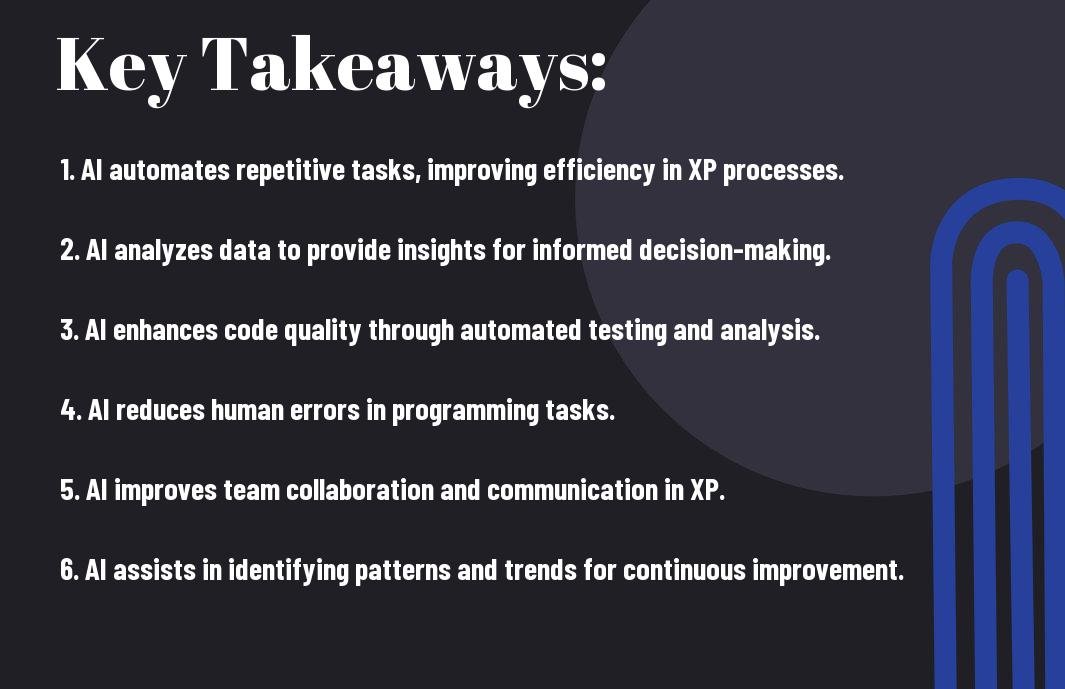Many advancements in AI technology have revolutionized the way software development teams implement Extreme Programming (XP) methodologies. With the ability to analyze vast amounts of data quickly and accurately, AI can enhance XP processes by identifying bottlenecks, predicting potential issues, and automating repetitive tasks. This powerful combination of human expertise and artificial intelligence ultimately leads to more efficient and effective software development practices.

Key Takeaways:
- Efficiency: AI can enhance Extreme Programming processes by automating repetitive tasks, enabling teams to focus on higher-value activities.
- Predictability: AI tools can provide valuable insights and predictions to help teams anticipate issues and plan accordingly in Extreme Programming.
- Continuous Improvement: By analyzing data and identifying patterns, AI can help teams improve their practices and achieve higher levels of productivity in Extreme Programming.
The Fundamentals of Extreme Programming
Before delving into the ways in which AI enhances Extreme Programming processes, it’s necessary to understand the fundamentals of Extreme Programming (XP). XP is one of the most prominent agile software development methodologies, emphasizing flexibility, communication, and high-quality deliverables. It promotes close collaboration between developers, customers, and stakeholders throughout the project lifecycle to ensure rapid feedback and adaptation to changing requirements.
Agile Development and its Evolution
// Agile development focuses on iterative and incremental development cycles
while (requirementsChange) {
beAdaptive();
}
Agile development methodologies, including Extreme Programming, have evolved as a response to the limitations of traditional waterfall approaches. Agile focuses on iterative and incremental development cycles, allowing teams to respond quickly to changing requirements and deliver working software in shorter time frames. This iterative approach enables constant feedback, leading to improved accuracy in meeting customer needs and expectations.
Key Principles of Extreme Programming
// Key principles of Extreme Programming
if (customerSatisfaction == true) {
beResponsive();
beCollaborative();
ensureQuality();
}
Agile methodologies, including Extreme Programming, are guided by several key principles. These principles emphasize customer satisfaction, responsiveness to change, collaboration between team members, and a focus on delivering high-quality software. By prioritizing customer needs, fostering communication and teamwork, and maintaining high development standards, Extreme Programming aims to produce valuable software that meets customer expectations effectively.
Extreme Programming stands out for its customer-centric approach and iterative development cycles, allowing for continuous feedback and adaptation. By placing a strong emphasis on collaboration, communication, and quality, XP helps teams deliver valuable software efficiently and effectively. However, the rapid pace and intense focus on customer needs can also introduce challenges, such as scope creep and potential for feature overload.

The Role of AI in Enhancing Extreme Programming
Even in the world of Extreme Programming, Artificial Intelligence (AI) is playing an increasingly vital role. AI technologies are being integrated into development processes to streamline workflows, improve code quality, and enhance overall productivity. By leveraging AI in Extreme Programming, teams can benefit from advanced automation, intelligent code analysis, and real-time insights that help them deliver high-quality software faster and more efficiently.
Automation of Repetitive Tasks
Repetitive tasks in software development can be a significant drain on productivity. AI-powered tools can automate these tasks, freeing up developers to focus on more complex and creative aspects of their work. For example, AI algorithms can be used to automatically generate boilerplate code, run tests, and even deploy changes to production environments. By automating repetitive tasks, developers can reduce errors, improve consistency, and accelerate the development process.
// Example of AI-powered automation tool
const aiAutomation = new AITool();
aiAutomation.generateCode();
aiAutomation.runTests();
aiAutomation.deployChanges();
Intelligent Code Review and Analysis
AI can also play a crucial role in code review and analysis. AI-powered tools can analyze code for bugs, security vulnerabilities, and adherence to coding standards. These tools can provide developers with real-time feedback, suggestions for improvements, and even predict potential issues before they arise. By leveraging AI for code review and analysis, teams can enhance code quality, reduce technical debt, and ensure that their software meets the highest standards of excellence.
// Example of AI-powered code analysis tool
const aiCodeAnalysis = new AICodeAnalyzer();
aiCodeAnalysis.analyzeCode();
aiCodeAnalysis.provideFeedback();
aiCodeAnalysis.predictIssues();
Even more crucial are the benefits of AI-enhanced code analysis beyond just finding bugs. These tools can help teams identify patterns, optimize performance, and suggest refactoring opportunities to improve code maintainability and scalability.
Analyzing code intelligently with AI can help developers uncover critical issues, boost productivity, and ultimately deliver more robust software solutions.
AI-Driven Code Generation and Refactoring
Not only does AI assist in code generation, but it also plays a crucial role in refactoring existing codebases to improve their efficiency and maintainability. Through machine learning algorithms, AI can analyze large code repositories to identify patterns, suggest code optimizations, and propose refactoring solutions. This automation of tedious tasks allows developers to focus on higher-level problem-solving and creativity while ensuring that the codebase adheres to best practices.
// Example of AI-driven code generation
function addNumbers(a, b) {
return a + b;
}
// Example of AI-driven code refactoring
// Before refactoring
if (condition) {
return true;
} else {
return false;
}
// After refactoring
return condition;
Benefits of AI-Assisted Coding
The integration of AI in the software development process brings numerous benefits, such as improved code quality, enhanced productivity, and reduced human error. AI tools can detect potential bugs, suggest optimal solutions, and even generate code snippets based on context. By augmenting developers’ capabilities, AI accelerates the coding process and helps teams deliver high-quality software faster.
// Example of AI-assisted code completion
// Developer types 'if '
// AI suggests code completion 'if (condition) { }'
Potential Drawbacks and Limitations
The reliance on AI for code generation and refactoring raises concerns about the maintainability of code produced by automated tools. As AI systems operate based on the patterns they have learned, there is a risk of generating non-standard or overly complex code that may be difficult for other developers to understand. Additionally, the black-box nature of some AI algorithms can make it challenging to troubleshoot issues or verify the correctness of automated refactoring decisions.
// Example of potential AI-generated code complexity
// AI suggests nested loops for a simple iteration
for (let i = 0; i < n; i++) {
for (let j = 0; j < m; j++) {
// Loop body
}
}
On the flip side, AI-driven code generation and refactoring tools can significantly boost efficiency and quality in software development processes. By leveraging AI's capabilities judiciously and combining them with human oversight and expertise, teams can harness the full potential of AI to create robust, maintainable codebases.
// Example of AI-driven code optimization
// AI identifies redundant code segments and suggests removal
// AI suggests replacing inefficient algorithms with more optimized ones
For instance, developers should carefully review and validate code changes proposed by AI tools to ensure that the resulting code is not only functional but also maintainable and easily understandable by the rest of the team. By striking a balance between leveraging AI for efficiency gains and preserving code quality, teams can fully benefit from the advancements in AI-driven code generation and refactoring.
I have embedded a resource related to AI integration in software development for further reading AI Integration: Transforming the Future of Software Development.
AI-Powered Testing and Debugging
Keep in mind that AI plays a crucial role in enhancing Extreme Programming (XP) processes by automating and improving various aspects of software development. In testing and debugging, AI-powered tools offer significant advantages in terms of efficiency and accuracy. Let's look into how AI is revolutionizing testing and debugging practices in the context of Extreme Programming.
- Automated Test Case Generation
- Intelligent Error Detection and Correction
Automated Test Case Generation
Testing is a critical part of software development to ensure the reliability and quality of the code. With AI-powered tools, developers can automate the generation of test cases, saving time and effort. These tools analyze the codebase, identify potential test scenarios, and create test cases automatically, covering a broader range of scenarios than manual testing. By utilizing AI for automated test case generation, teams can enhance their testing practices and catch potential issues early in the development cycle.
For more insights on the intersection of AI and software development processes, check out Today's Role of AI in Software Development Processes.
Intelligent Error Detection and Correction
For developers following Extreme Programming, intelligent error detection and correction tools powered by AI offer a substantial advantage. These tools can not only identify bugs and errors in the code but also provide suggestions and fixes to address them. By leveraging AI algorithms, these tools continuously learn from patterns in the codebase and improve their accuracy over time, leading to more efficient debugging processes.
- AI-powered debugging tool example:
// AI-powered error detection and correction
function checkCodeQuality(code) {
// AI algorithm to detect and correct errors
}
For teams practicing Extreme Programming, having intelligent error detection and correction tools can significantly boost productivity and reduce the time spent on manual debugging tasks. These AI-powered tools act as virtual teammates, assisting developers in maintaining clean and error-free codebases.
Understanding the capabilities of AI in testing and debugging processes can lead to more efficient and reliable software development in Extreme Programming. By automating test case generation and leveraging intelligent error detection and correction tools, teams can streamline their workflows and produce high-quality code consistently. The integration of AI into XP practices marks a significant advancement in software development methodologies, paving the way for more innovative and effective programming processes.
Collaboration and Communication in AI-Enhanced XP
AI algorithms can enhance collaboration and communication within Extreme Programming (XP) teams through automated suggestions, data analysis, and real-time feedback. By integrating AI tools into XP processes, teams can streamline their communication and collaboration efforts, leading to more efficient development cycles and higher-quality output.
AI-Facilitated Team Communication
Communication in XP teams is crucial for successful software development. AI can help facilitate team communication by providing automated notifications for task deadlines, organizing virtual stand-up meetings, and generating real-time progress reports. These AI-powered tools can improve team coordination and ensure that all members are on the same page throughout the development process.
Enhanced Code Review and Feedback
On top of facilitating communication, AI can greatly enhance code reviews and feedback processes in XP. AI tools can automatically analyze code quality, detect potential bugs or vulnerabilities, and provide detailed suggestions for improvement. This not only speeds up the code review process but also helps developers learn from their mistakes and write better code in the future.
It is important to note that AI-enhanced code review and feedback systems should not replace human oversight entirely. While AI can assist in identifying common coding errors and improving overall code quality, human review is still necessary to catch more nuanced issues and ensure the software meets the specific requirements of the project. By combining AI capabilities with human expertise, XP teams can achieve a balance that maximizes efficiency and software quality.
With AI-enhanced collaboration and communication tools in Extreme Programming, teams can experience improved coordination, enhanced code quality, and streamlined development processes. By leveraging AI algorithms to automate routine tasks and provide valuable insights, XP teams can focus their efforts on creativity and problem-solving, ultimately delivering high-quality software products in a more efficient manner.
Overcoming Challenges and Limitations
Many challenges and limitations exist when implementing AI in enhancing Extreme Programming processes. These include addressing bias and transparency issues, ensuring human oversight and accountability, and navigating the complexities of integrating advanced technologies into Agile development practices.
Addressing Bias and Transparency Issues
- Implement algorithmic fairness techniques
- Regularly audit AI systems for bias
- Ensure transparency in AI decision-making processes
To address bias and transparency issues in AI-driven Extreme Programming, teams can implement algorithmic fairness techniques, conduct regular audits on AI systems for bias detection, and ensure transparency in AI decision-making processes. By incorporating these practices, teams can mitigate the risks associated with biased algorithms and enhance the overall reliability of AI systems.
Ensuring Human Oversight and Accountability
- Establish clear guidelines for human intervention in AI decisions
- Implement mechanisms for tracking and explaining AI outputs
- Conduct regular training on ethical AI usage for team members
Oversight is crucial in AI-augmented Extreme Programming to ensure human intervention in critical decision-making processes. Establishing clear guidelines for human oversight, implementing mechanisms for tracking and explaining AI outputs, and conducting regular training on ethical AI usage are vital steps to maintain accountability within Agile development teams while leveraging AI technologies.
Plus, teams must always prioritize ethical considerations when integrating AI into Extreme Programming practices. By fostering a culture of transparency and accountability, organizations can harness the benefits of AI while mitigating potential risks and ensuring that human values and ethical standards are upheld throughout the software development lifecycle.
To wrap up
With these considerations, it is evident that AI plays a crucial role in enhancing Extreme Programming processes. By automating repetitive tasks, predicting potential risks, and providing valuable insights, AI can help teams streamline their workflows, improve their decision-making processes, and ultimately deliver higher quality software products in a more efficient manner. Embracing AI technologies in the context of Extreme Programming can lead to increased productivity, better code quality, and faster time-to-market for software development projects.
FAQ
Q: What is Extreme Programming (XP)?
A: Extreme Programming (XP) is a software development methodology that aims to improve software quality and responsiveness to changing customer requirements. It emphasizes customer satisfaction, flexibility, teamwork, and continuous feedback.
Q: How does AI enhance Extreme Programming processes?
A: AI enhances Extreme Programming processes by automating repetitive tasks, predicting potential issues, optimizing code quality, and providing valuable insights for decision-making. By leveraging AI tools, XP teams can improve productivity, efficiency, and overall project success.
Q: What are some examples of AI applications in Extreme Programming?
A: Some examples of AI applications in Extreme Programming include code analysis tools, automated testing solutions, bug detection algorithms, project management platforms with predictive analytics, and virtual assistants for team communication and collaboration. These AI technologies help XP teams streamline their workflow and deliver high-quality software products faster.











